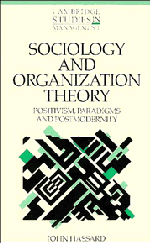Book contents
- Frontmatter
- Contents
- List of figures and tables
- Acknowledgements
- Introduction
- 1 Foundations of orthodoxy
- 2 The hegemony of systems
- 3 From functionalism to fragmentation
- 4 Closed paradigms and analytical openings
- 5 Multiple paradigm research
- 6 Postmodernism and organization
- Notes
- Bibliography
- Author index
- Subject index
- Cambridge Studies in Management
6 - Postmodernism and organization
Published online by Cambridge University Press: 03 May 2011
- Frontmatter
- Contents
- List of figures and tables
- Acknowledgements
- Introduction
- 1 Foundations of orthodoxy
- 2 The hegemony of systems
- 3 From functionalism to fragmentation
- 4 Closed paradigms and analytical openings
- 5 Multiple paradigm research
- 6 Postmodernism and organization
- Notes
- Bibliography
- Author index
- Subject index
- Cambridge Studies in Management
Summary
The postmodernism debate poses in a very dramatic way the issue of competing paradigms for social theory and the need to choose paradigms that are most theoretically and practically applicable to social conditions in the present era.
(Kellner 1988a, p. 276)Introduction
In this final chapter, we introduce a new paradigm for social and organization theory – postmodernism. We start by contrasting modern and postmodern forms of explanation, and explore a family of terms derived from these two generic concepts. In so doing, we consider whether postmodernism is better described as an ‘epoch’ or an ‘epistemology’, a distinction which underpins much current debate.
We then go on to assess the chief theoretical positions of modernism. Here we analyse the differences between ‘critical’ and ‘systemic’ modernism, and outline Habermas' well known ‘defence of modernity’. The section is completed by a review of different approaches to the modernist trajectory in organizational analysis.
Finally, through reference to the works of Jean Baudrillard, Jacques Derrida and Jean-Francois Lyotard, we produce an inventory of post-modern concepts for social theory. When coupled with the distinction between epoch and epistemology, this inventory provides a framework for a nascent postmodern theory of organizations. A case study of a deconstructionist approach to organizational power is described.
- Type
- Chapter
- Information
- Sociology and Organization TheoryPositivism, Paradigms and Postmodernity, pp. 111 - 138Publisher: Cambridge University PressPrint publication year: 1993
- 82
- Cited by

